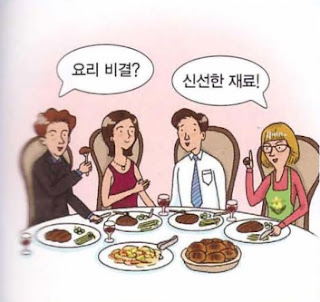가: 와, 진짜 맛있네요. 요리 솜씨가 좋으신데 무슨 특별한 비결이라도 있나요?
Wow, this is really delicious. You’re so talented at cooking. Is there some special secret to your skill?
나: 주부들은 다 기본적으로 하는 건데요, 뭐. 비결이라고 까지 말할 수 없지만 저는 음식의 맛은 얼마나 신선한 재료를 쓰느냐에 달려 있다고 생각해요.
This is basic knowledge for all housewives. I wouldn’t call it a secret, but I think the taste of food depends on how fresh the ingredients that are being used are.
가: 재료가 중요한 거군요. 다음에는 무슨 음식을 만들어서 저를 초대해 주실 거예요? 하하하.
Ingredients are important. So what kind of food will you make the next time you invite me over? Ha-ha.
나: 음, 그건 손님이 어떤 음식을 먹고 싶으냐에 달려 있으니까 케빈 씨가 먹고 싶은 것을 말해 보세요.
Um, that depends on what kind of food the guest wants to eat, so please tell me what you want to eat, Kevin.
-느냐에 달려 있다 is used to indicate that the circumstances or situation described in the preceding clause depend on the content of the following clause. It is often used together with a question word, such as 얼마나 or 어떻게.

▼ 형용사 현재형의 경우 ‘-냐에’와 ‘으냐에’ 둘 다, 동사의 현재형은 ‘냐에’와 ‘느냐에’ 둘 다 가능합니다. 그리고 과거형은 ‘-았/었/였/이었-’ 뒤에 ‘-느-’를 생략해도 되고. 넣어서 써도 됩니다.
• 모든 일은 어떻게 생각하느냐에 달려 있어요.
Everything depends on how you think about it.
• 십 년 후의 우리 모습은 지금 어떤 목적을 가지고 어떻게 살고 있느냐에 달려 있는 것 같아요.
It seems that our lives 10 years from now will depend on what goals we set and how we live our lives now in the present.
• 이번 일의 결과는 그동안 얼마나 열심히 준비했느냐에 달려 있어요.
The results of our current jobs depend on how well we prepared during the time leading up to them.
1. This expression is also often used in the forms -고 안/못 – 고는 – 느냐에 달려 있다 and -고 안/못 -는 것은 -느냐에 달려 있다.
• 사람들에게 사랑을 받고 안 받고는 자기가 어떻게 하느냐에 달려 있어요.
• 이번 일이 성공하고 못 하는 것은 그동안 얼마나 열심히 준비했느냐에 달려 있어요.
2. This expression is used in the form 에/에게 달려 있다 when used together with a noun.
• 이번 일의 결정은 여러분의 선택에 달려 있어요.
• 우리나라의 미래는 자라나는 청소년들에게 달려 있어요.
3. This expression can also be used in the form -기에 달려 있다 when used with a verb.
• 행복은 마음먹기에 달려 있어요.
• 모든 일은 생각하기에 달려 있어요.
4. This expression can be replaced with -는가에 달려 있다 and -는지에 달려 있다 with almost no change in meaning.
• 모든 일은 어떻게 생각하는가에 달려 있어요.
• 이번 일의 결과는 그동안 얼마나 열심히 준비했는지에 달려 있어요.
>> You can click on the title of each grammar below to see other grammars which also express ‘Conditions and Decisions’
2. -(으)ㄹ라치면
3. -노라면
4. -느냐에 달려 있다
5. -기 나름이다
>> Full of ‘Korean grammar in use – Advanced’: Click here
>> Full of ‘Korean grammar in use – Intermediate’: Click here

